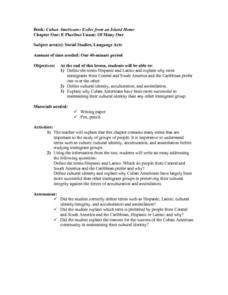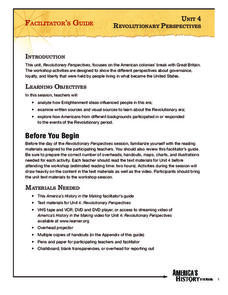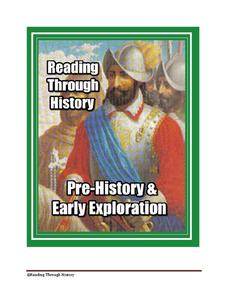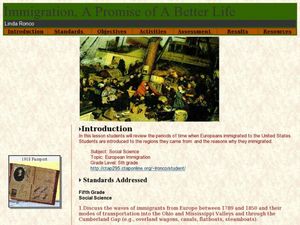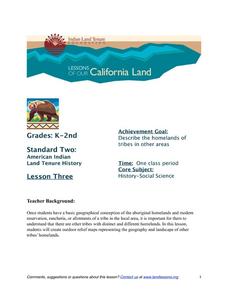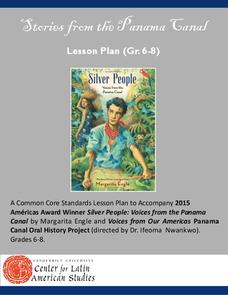Curated OER
Cuban Americans: Exiles from an Island Home
Middle schoolers define the terms Hispanic and Latino and explain why most immigrants from Central and South America and teh Caribbean prefer one over the other. They define cultural identity, acculturation, and assimilation. Students...
Annenberg Foundation
Revolutionary Perspectives
Life, liberty, and the pursuit of happiness. Learners go to the heart of the causes of the American Revolution. Examining political cartoons, Enlightenment documents, and firsthand accounts, they present their ideas and reflective...
Jamestown-Yorktown Foundation
How Do We Know about Colonial Life?
Young history sleuths examine an inventory of the belongings of a Virginia colonist and use deductive reasoning to determine what the document reveals about colonial life. They then use a Venn diagram to compare the inventory with a...
Curated OER
What Was Columbus Thinking?
Why is Christopher Columbus one of the most studied figures in history? Upper graders will investigate why Christopher Columbus traveled to the New World and what happened to the native people he encountered. They read and discuss...
Reading Through History
Early History and Exploration Unit
We all know about Christopher Columbus, but who else explored the Americas, and specifically, the future United States of America? Learners find out these answers and more in a resource that includes four different reading sections,...
Curated OER
A Lesson To Accompany "The First Bank of the United States: A Chapter in the History of Central Banking"
Here is an interesting topic. Learners examine the economics that led to the founding of the First Bank of America. They participate in a reader's theater experience depicting the debate between Alexander Hamilton and Thomas Jefferson...
National Endowment for the Humanities
Walt Whitman to Langston Hughes: Poems for a Democracy
Explore the idea of democratic poetry. Upper graders read Walt Whitman, examining daguerreotypes, and compare Whitman to Langston Hughes. They describe aspects of Whitman's I Hear America Singing to Langston Hughes' Let America Be...
Scholastic
Opioids and the Overdose Epidemic
Learn about the opioid and overdose epidemic in America with an article that explains what opioids are, how they are used, and how they are abused. Learners discover the death rates associated with opioid overdoses and other factors that...
Curated OER
Having Fun: Leisure and Entertainment at the Turn of the Twentieth Century
Students explore how the innovations in culture and technology influenced the development of a leisure industry in America at the turn of the twentieth century.
Curated OER
What's in a Number? Analyzing Smoking Statistics
Sixth and seventh graders analyze smoking statistics. In this health lesson, learners look at the percentage of people who smoke from each race group. They create a bar graph and circle graph that displays this information.
ProCon
Gun Control
According to some estimates, there are more guns than people in the United States. Learners decide if America should enact more gun control laws. They analyze information about gun deaths in the United States by year, read about the...
Curated OER
Compare and Contrast Timelines of the World
Seventh graders create a classroom timeline of important world events. This instructional activity is meant to be used during the entire school year. As the school year goes along, events are added to the timeline as chosen by the class....
DocsTeach
How Effective were the Efforts of the Freedmen’s Bureau?
Effective or ineffective? As part of a study of post Civil War America, young historians analyze a series of primary sources to evaluate the effectiveness of the Freedmen's Bureau in addressing the challenges faced by the slaves freed by...
Curated OER
Run Your Own Boarding House
Students become familiar with the historical and sociological aspects of the boarding house phenomenon in America. As students work in groups, they read and analyze documents that will help them gain a deeper understanding. To...
Curated OER
Immigration - A Promise of Better Life
What a great way to discuss European immigration in the 1700's to 1800's in America. Learners identify regions where immigration occurred, list the reasons people moved to the United States, and interview an immigrant about their...
K12 Reader
Broken Promises
This comprehension worksheet asks readers to respond to a series of questions based on an article about the treatment of native peoples.
US Citizenship and Immigration Services
Thanksgiving 3—Traditions
Thanksgiving is a treasured national holiday, but it can look different from table to table. Through a reading passage, real-world images, and class discussion, scholars take a look into Thanksgiving's importance to the United States of...
Jamestown-Yorktown Foundation
What Was Everyday Life like in Colonial Virginia?
What was everyday life like in Colonial Virginia? To find the answer cooperative groups work collaboratively to read an informational handout and complete a graphic organizer. The speaker of the group then shares their new-found...
Annenberg Foundation
A Nation Divided
Can a presidential election cause a civil war? Learners research the events surrounding the presidential election of 1860 in a lesson that explores America's history. Using maps, videos, and primary sources, they uncover, brainstorm, and...
Annenberg Foundation
The New Nation
The conclusion of the American Revolution brought about a new conflict—choosing the stye of government for the newly formed United States. Using the views of both Federalists and Anti-Federalists, learners work in pairs and groups to...
Curated OER
The Roaring Twenties
Let's take a look back at America during the 1920s and 1930s. Information regarding the economics in the 1920s that led to some of the issues during the 1930s are covered using text and images. Learners will consider economic booms,...
National Endowment for the Humanities
Revolution '67, Lesson 1: Protest: Why and How
To some people, protesting is as American as apple pie, but the factors that lead to protests can be as confusing to veteran activists as to today's youth. Revolution '67 explores the riots in Newark, New Jersey as a case study. Using...
Indian Land Tenure Foundation
More Tribal Homelands
Here is a very fun idea that introduces young learners to how geographical location affects cultural development. They are introduced to four areas where Native Americans have lived in the past by reading stories and examining images....
Vanderbilt University
Stories from the Panama Canal
The stories of the Silver People, the West Indies immigrants hired to work on the Panama Canal, come to life in a lesson about the building of the Panama Canal. Groups research why the canal was built, how it was build, the working...


